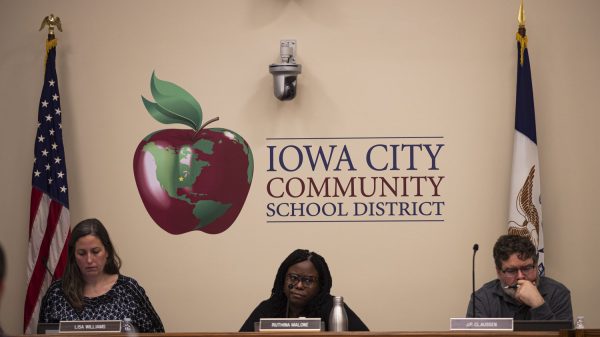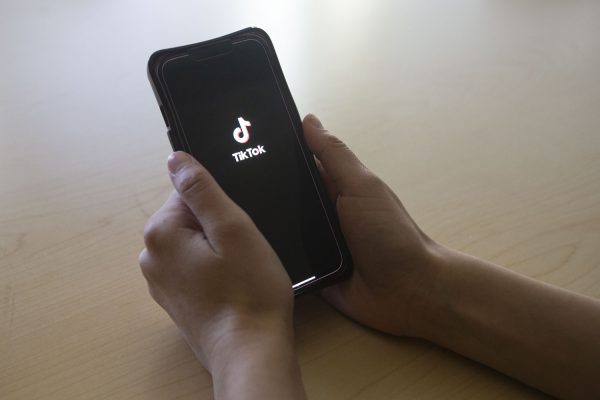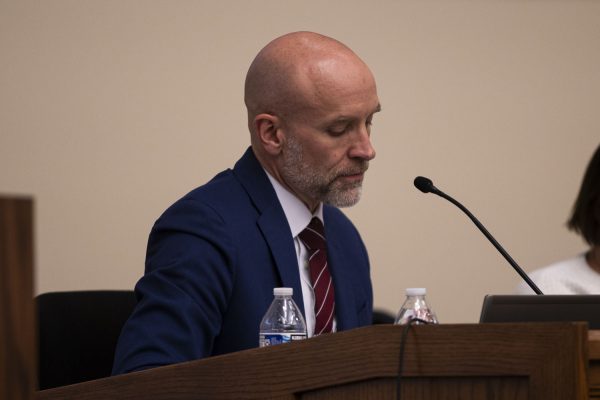Iowa judge upholds voter ID requirement, strikes down signature matching in the 2017 voter ID law
An Iowa judge ruled Monday that parts of the 2017 voter ID law are unconstitutional, but upheld a provision that the state can require an approved form of identification at the polls.
Secretary of State Paul Pate addresses members of the media at the Kim Reynolds watch party at the Hilton in Des Moines on Tuesday Nov. 6, 2018.
October 1, 2019
An Iowa judge ruled a few parts of a 2017 voter ID law as unconstitutional, though upheld the state’s requirement to show ID at the polls after the law was challenged by an Iowa State University student and the League of United Latin American Citizens of Iowa.
Fifth District Judge Joseph Seidlin ruled Monday that the state can require an approved form of identification at the polls and on an absentee ballot. Seidlin struck down a part of the law that allows election officials to withhold a ballot if a signature doesn’t match another on file.
The judge also ruled that the secretary of state couldn’t include any language on an absentee ballot application that construed an absentee ballot was “required” to have an ID number in order for the vote to count. Siedlin also struck down a sentence in the law that prevented elections officials from issuing voter ID cards to those who are listed in the Iowa Department of Transportation’s records as having a valid driver’s license or nonoperator’s ID.
“This ruling is a victory for election integrity,” Iowa Secretary of State Paul Pate, who championed the 2017 election changes, said in a statement. “My goal has always been to make it easy to vote, but hard to cheat. Iowans have overwhelmingly voiced their support for Voter ID and this law ensures voters will be asked to provide identification before casting their ballot.”
The Iowa Democratic Party also framed the ruling as positive, calling it a “step in the right direction,” in a tweet, but added that the ruling didn’t overturn the entire law.
ISU student Taylor Blair, the plaintiff in the Iowa voter ID lawsuit, said he was “thrilled” with the ruling.
“Overturning these constitutional attacks on voting rights in Iowa is exciting, but we can’t forget that barriers still exist. We must continue working to ensure that the ballot box is accessible to everyone,” he said in the statement.
A sticking point on university and college campuses across the state has been that some students are not able to use university-issued ID cards, because they lack an expiration date.
ISU will update its ID cards in 2020 to include an expiration date so students can use them at the polls, and students will also be required to show proof of Iowa residency. The Daily Iowan reported in August that university officials said the addition of an expiration date would be too expensive.
Some 2020 Democratic presidential hopefuls have weighed in on the decision. Montana Gov. Steve Bullock said in a statement that the ruling will lead to voter suppression.
“The right to vote is one of the Great Equalizers that defines our American identity,” Bullock said in the statement. “In Montana, I worked to make it easier to cast a ballot on Election Day, including protecting same-day voter registration and expanding satellite voting across rural communities.”
Iowa State Rep. Chris Hall, Iowa political director for former Texas. Rep Beto O’Rourke, said in a statement that Seidlin’s ruling is a “victory for Iowans and our constitutional right to vote.”
“Republicans across the country have fought to restrict access to the ballot box, and as president, Beto O’Rourke will ensure everyone’s voices are heard in our democracy,” Hall said in the statement.
Editor’s note: A previous version of this report said that the judge struck down voter ID requirements for absentee ballots. It has been updated to reflect the judge’s ruling upholding that the state can require an ID for absentee ballots.





















